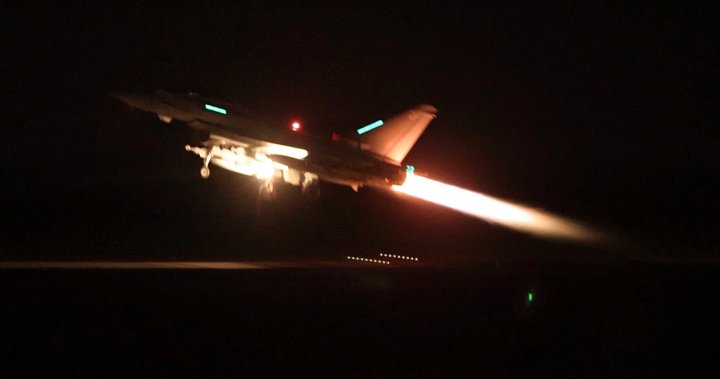The risk of further escalation after the United States and Britain launched airstrikes on Houthi targets in Yemen in response to the Iran-backed rebel group’s attacks on ships in the Red Sea may be limited, a former U.S. diplomat says.
Frank Lowenstein, who served as the U.S. special envoy for Middle East peace during the second Obama administration, says Washington is likely more focused on addressing the potential threat of Hezbollah to Israel and growing violence in the West Bank rather than on how the Houthis may respond to Thursday’s strikes.
That’s because the strikes were targeted toward crippling the Houthis’ ability to launch such attacks in the future.
“I think the risk of escalation in Yemen is relatively limited — there’s only so much more that the Houthis can really do beyond what they’ve been doing right now,” he told Eric Sorensen in an interview that aired Sunday on The West Block.
“We tried as hard as we could to avoid (an offensive military response), and now I think the process is just one of containing it as much as we can.”
Thursday’s strikes came days after the U.S., U.K. and other countries — including Canada — issued a stern warning to the Houthis to stop launching ballistic missiles and combat drones at vessels operating in the Red Sea, which is a key global trade route, or face “consequences.”

The Houthis had only escalated their attacks since then, culminating in a massive barrage of projectiles on Tuesday that were shot down by the British and American militaries. It was the 27th such attack since early November.
The Houthis are an Iran-backed rebel group that has been attacking western commercial and military vessels in the Red Sea in opposition to Israel’s military offensive in Gaza, which itself was launched in response to Hamas’ attack on Israel in October.
Ottawa said Friday that Canadian Armed Forces personnel deployed with U.S. Central Command supported Thursday’s airstrikes in Yemen, which the U.S. and British governments said targeted weapons storage locations, air defence systems and missile and drone launch facilities used by the Houthis.
A senior Pentagon official said Friday the U.S. is “very confident” the strikes were effective in degrading the Houthis’ ability to launch future attacks.
Get the latest National news.
Sent to your email, every day.
The Houthis have vowed the strikes in Yemen “will not go unanswered and unpunished.”

Lowenstein says American diplomatic efforts led by U.S. Secretary of State Antony Blinken have so far worked to prevent the conflict in Gaza from spreading into a broader regional dispute in the Middle East, including avoiding war with Hezbollah and keeping “the West Bank from disintegrating entirely.”
But those efforts have also done little to advance the ultimate goal of a long-term peace between Israel and the Palestinian people, or the more immediate need to address the growing humanitarian crisis in Gaza.
More than 23,000 Palestinians have been killed since Israel began bombarding Gaza after the Oct. 7 Hamas attacks, according to the Hamas-run Gaza Health Ministry.
But the United Nations and other aid groups are also pointing to the possibility of further deaths due to famine and disease among the roughly two million Palestinians stuck in Gaza without access to food, water and medical supplies thanks to an Israeli blockade.
“You could be looking at casualties on a scale that would dwarf what we’ve seen so far in the military conflict, unless Israel changes its position significantly with respect to allowing humanitarian assistance in,” Lowenstein said.
He added the humanitarian crisis threatens to expose and deepen the rift between Israel and the U.S., which remains Israel’s staunchest ally but has grown more vocal in its calls for Prime Minister Benjamin Netanyahu’s government to consider the human toll of the conflict.

U.S. President Joe Biden has also faced increasing pressure at home as he heads into what is expected to be a tough campaign for re-election in November.
“I really can’t stress enough … what an impossible position a lot of perfectly innocent people in Gaza have been put in,” Lowenstein said. “Given that we are so invested in this war, we are by extension to blame for that disaster.
“I think we’re really going to be pushing the Israelis on that as much as we can and hoping that they’re really going to change course in a fundamental way on that front. Otherwise, you could be looking at a big breach between the U.S. and Israel publicly.”
Israel to carry on in Gaza for months
Despite that pressure, Lowenstein predicts Israel will continue its military campaign in Gaza for months. The Israeli military and government have said publicly they won’t stop until every Hamas leader and fighter involved in the Oct. 7 attacks are killed.
“The military campaign is nowhere near having achieved its (stated) objectives, and so the Israelis have no intention of backing down,” he said.
The longer Israel stays in Gaza, the longer a broader peace in the region is threatened, he adds. The U.S. is still intent on securing normalization ties between Israel and Saudi Arabia, and billions of dollars will be needed from Arab nations toward the reconstruction of Gaza after the military conflict ends.

Most importantly, while Lowenstein says a two-state solution remains the ultimate goal of the U.S., Canada and much of the western world, Netanyahu and his hardline conservative government have shown little interest in considering the idea — especially in the middle of the current conflict.
Some of Netanyahu’s top cabinet officials, including Israeli National Security Minister Itamar Ben-Gvir, have expressed desire for Palestinians to be relocated from Gaza to other countries, which the U.S. and Canada have condemned.
“Their mentality (in Israel) is nowhere near conducive to a two-state solution, and I don’t think that’s going to change as long as Prime Minister Netanyahu is in power,” Lowenstein said.
However, he notes that his diplomatic career in the Middle East taught him to “never count out” Netanyahu — though the Israeli leader known colloquially as Bibi may be running out of support.
“I think this is all going to come to a head in the next few months,” he said. “Whether Bibi makes it out or not is really anyone’s guess.”
© 2024 Global News, a division of Corus Entertainment Inc.




